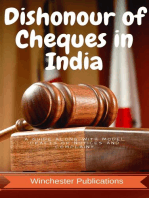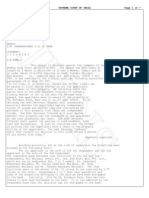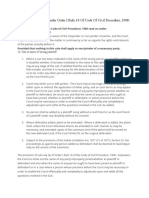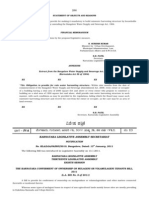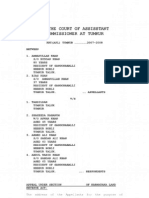0 ratings0% found this document useful (0 votes)
1K viewsDelay in Justice Delivery System by J S Rajawat
Delay in Justice Delivery System by J S Rajawat
Uploaded by
Sridhara babu. N - ಶ್ರೀಧರ ಬಾಬು. ಎನ್The document discusses the issue of delays in India's criminal justice system and proposes solutions to reduce them. It notes that the current system was designed by the British to protect rulers, not provide swift justice to the masses. It argues that the judiciary should work 365 days a year instead of taking long vacations. It also says that judges should focus solely on judicial work instead of administrative duties, and be more punctual and less liberal with adjournments to reduce delays. The author believes addressing these issues could help clear the backlog of over 3 crore pending cases within existing resources.
Copyright:
© All Rights Reserved
Available Formats
Download as PDF, TXT or read online from Scribd
Delay in Justice Delivery System by J S Rajawat
Delay in Justice Delivery System by J S Rajawat
Uploaded by
Sridhara babu. N - ಶ್ರೀಧರ ಬಾಬು. ಎನ್0 ratings0% found this document useful (0 votes)
1K views14 pagesThe document discusses the issue of delays in India's criminal justice system and proposes solutions to reduce them. It notes that the current system was designed by the British to protect rulers, not provide swift justice to the masses. It argues that the judiciary should work 365 days a year instead of taking long vacations. It also says that judges should focus solely on judicial work instead of administrative duties, and be more punctual and less liberal with adjournments to reduce delays. The author believes addressing these issues could help clear the backlog of over 3 crore pending cases within existing resources.
Original Description:
An article on speedy justice in india
Original Title
Delay in Justice Delivery System by j s Rajawat
Copyright
© © All Rights Reserved
Available Formats
PDF, TXT or read online from Scribd
Share this document
Did you find this document useful?
Is this content inappropriate?
The document discusses the issue of delays in India's criminal justice system and proposes solutions to reduce them. It notes that the current system was designed by the British to protect rulers, not provide swift justice to the masses. It argues that the judiciary should work 365 days a year instead of taking long vacations. It also says that judges should focus solely on judicial work instead of administrative duties, and be more punctual and less liberal with adjournments to reduce delays. The author believes addressing these issues could help clear the backlog of over 3 crore pending cases within existing resources.
Copyright:
© All Rights Reserved
Available Formats
Download as PDF, TXT or read online from Scribd
Download as pdf or txt
0 ratings0% found this document useful (0 votes)
1K views14 pagesDelay in Justice Delivery System by J S Rajawat
Delay in Justice Delivery System by J S Rajawat
Uploaded by
Sridhara babu. N - ಶ್ರೀಧರ ಬಾಬು. ಎನ್The document discusses the issue of delays in India's criminal justice system and proposes solutions to reduce them. It notes that the current system was designed by the British to protect rulers, not provide swift justice to the masses. It argues that the judiciary should work 365 days a year instead of taking long vacations. It also says that judges should focus solely on judicial work instead of administrative duties, and be more punctual and less liberal with adjournments to reduce delays. The author believes addressing these issues could help clear the backlog of over 3 crore pending cases within existing resources.
Copyright:
© All Rights Reserved
Available Formats
Download as PDF, TXT or read online from Scribd
Download as pdf or txt
You are on page 1of 14
DELAY IN JUSTICE DELIVERY SYSTEM BY J S RAJAWAT
AN ALL YEAR JUSTICE DELIVERY SYSTEM
The notion that ordinary people want black-
robed judges, well dressed lawyers, fine paneled courtrooms as the setting to resolve their disputes, is not correct. People with
legal problems. like people with pain, want relief and they want it as quickly and inexpensively, Justice Warran Burger, former
Chief Justice of the American Supreme Court
INTRODUCTION
R M Lodha , C J I, stressed the need to keep the courts open 365 days in a year
whereas presently , the Supreme court has 193, High courts 210 and trial courts
245 working days in a year to fight monstrous backlog of over 2 crores cases.
1
and called it as One of the grey areas, where our justice delivery system has failed
to come up to the peoples expectations is that the judiciary has failed to deliver
justice expeditiously . This delay in delivery of justice is in fact one of the greatest
challenges before the judiciary. The problem of delays is not a new one it is as
old as the law itself. The problem has assumed such a gigantic proportion that
unless it is solved speedily and effectively, it will in the near future crush
completely the whole edifice of our judicial system
2
.Delay in context of justice
denotes the time consumed in the disposal of case, in excess of the time within
which a case can be reasonably expected to be decided by the court. An expected
life span of a case is an inherent part of the system.
Delay in disposal of cases not only creates disillusionment amongst the litigants,
but also undermines the very capability of the system to impart justice in an
efficient and effective manner. Long delay also has the effect of defeating justice
in quite a number of cases
3
The huge back log in the courts has been the subject of
number of Reports, debates in parliament and state legislatures ,in Judicial
conferences and the Media. Chief Justice Anand Observed:"The consumers of
justice want unpolluted, expeditious and inexpensive justice. In its absence, instead
1
TOI dated may 16
th
page 1 Jaipur edition
2
C.L. Aggawwal, Laws Delay and Acccumlation of arrears in the High Courts. The Journal
of Bar Council of India Vol. 7(1): 1978 p 41.
3
CJI Justice K.G. Bala Krishnan Efficient Functioning of Indias Justice Delivery System
(2007) 4 SCC J-15
of taking recourse to law, he may be tempted to take law in his own hands. This is
what the judicial system must guard against so that people do not take recourse to
extra judicial methods to settle their own scores and seek redress of their
grievances.
4
Therefore, the important question is: how the various compontant of
justice delivery system can improve the situation. This issue has been examined
by law commission in its 77
Th
voluminious report and justice Y K Sabharwal has
also addressed the issue while delivering the lecture on Sobhagmal Memorial
lecture on 25
th
July 2006. The CJI outlined a five-point agenda to cope with
tribulations facing the judiciary. Justice Lodha called for an all- year justice
delivery system. Law and justice field has its dignity and it must be maintained in
order to keep the trust of the people in judicial system, he added.Judiciary should
indeed be developed so as to ensure the enforcement of the rights of the citizens, as
envisioned by the Constitution of India. Enforcing the five point agenda will
indeed, allow the citizens to value and expand their rights rather than allow them to
be crippled by the handicaps of judicial power or budgeting concerns.
5
In this article I am confining myself with criminal justice delivery system because
one of my reader R.Mohandoss has requested while commentating on my article
Declining credibility of judicial precedent in India
6
that I should write to cut short
delay in criminal justice delivery system. The delay in criminal justice delivery
system may be categorized as, First to check un necessary institution of criminal
cases at vary inception which are being instituted for statically purpose at police
station and some time judiciary force the police to file more case so that it can be
showed disposal in their popular program me for which they get huge budget from
government(Lokadalat) and lastly police submits unmerited cases in court for
political compulsion and otherwise. Secondly, how to decide the cases pending in
courts.
(1)The Role of judiciary:- Present judicial system is based on the system which
prevailed during British raj, where imparting justice to masses was not priority.
the main aim of the judicial system was to protect the interest of the ruling class
with semblance of being just and fair to the ruled. This system is totally out of
tune with the tenets of a welfare state which we adopted after independence but
successive governments which came did not find enough time to make/ amend
4
Chief Justice A.S. Anand: Indian Judiciary & Challenges of 21st century. The Indian Journal of
Public Administration July-Sept 1999 Vol XLV No. 3, p 299
5
CJI R M Lodha on Law live.com dated 19
th
may 2014
6
Article on lawyers club India.com
the British law which were meant to suppress the ruled . in this connection it will
not be out of place to mention that large number of vacations system i.e summer
vacation, winter vacation, Dashara vacation , Durga puja etc. The vacations nearly
eat away and consumes about 60 working days besides Sunday, saturaday and
other festivals and National holidays in a year was introduced in judicial system
for British judges . The summer vacations was intended to help Europian judges in
pre- Independence period to go to England and spent some time in their country.
When more than three crores of cases are pending in Indian courts. It is highly
unfair to judicial institution to have 60 ideal days on this score.
There is constant demand of appointing judges in proportion to population . The
such demand can be justified in sectors of basic human need which popularly
known as Roti, Kapara and Makan and in this list we can aid some other sector
like Health, education, nutration and drinking water etc . National resources must
be utilized for welfare of maximum number of people and not on any institution
who is not utilizing there available resources . All essential services work round
the clock but judiciary enjoy large noumber of vacations i.e summer vacation,
winter vacation, Dashara vacation , Durga puja etc. The vacations nearly eat away
and consumes about 60 working days besides Sunday, saturaday and other festivals
and National holidays in a year and was inherited by colonial rule. Thus in the
above background it is to be seen that how system can yield more result in
present available resources because India is a poor and developing country and
can not afford more budget allocation to this sector as we still failed to provide
basic human need/ facilities to our citizen and in that sense I am proposing solution
of problem within present available resources .
(i) lack of punctuality, laxity and lack of control over case-files and court-
proceedings, attending social and otherfunctions during working hours contribute
in no small measure in causing delays in the disposal of cases
7
.
(ii) Some judges are very liberal in granting adjournments.
(iii) Some judges come to courts without reading case-files, therefore, the lawyers
have to spend a lot of time just to explain the facts of the case and legal point (s)
involved therein. Therefore, they argue at length and all this leads towastage of
precious Courts Time. There is a great need for self improvement by Judges.
7
CJI A.S. Anand: Indian Judiciary and Challenges of 21st century: The Indian Journal of Public
Administration: July-Sept 1999 vol XLV No. 3, p 300
judiciary first itself has to honestly take imitative to curb the delay in disposal
of case rather than to blame government and other component of system. First step
in this direction must be deploy allof its judicial officer in judicial work as it will
be surprising to know that about 10% of their strengthen are working on
administration in govt./ Departaments and High court Registry which can well be
performed be administrative / other legal services ofiicers of state. In Rajasthan
judicial officers are working on post of Principal secretary to dy. Secretary in
government, Registrar General to Dy. Registrar in High court administration, in
legal services, vidhan sabha, publicservise commission , huminrights commission,
Lokaykut etc. to perform totally non judicial function. Judiciary is always
demanding for increasing posts but they are not utilizing the available officer in
judicial work and that not for any pious reason but as every body aware in
administration there are easier opportunity of making money/ obliging people and
developing liaison.
(2) Role of Government
The state is also responsible for causing delay in the dispensation of justice. The
government "contributes" to theproblem of delay by its own lack of priority for
matters relating to the administration of justice. This may happen indifferent ways,
namely - delay in judicial appointments
8
lack of manpower needed for maintaining
an efficient and areasonable legal system and lack of adequate infrastructure
facilities in the Court both for the bench and the bar
9
.Poor infrastructure in the
courts and absence of computerized records etc. This is the age of technology,
today even the smallest office in the private sector is well equipped with computers
andother electronic gadgets, which help them to raise their efficiency and update
their records. But our Judiciary has notbeen provided with the technical assistance
of faxes, dicto-phones and other such devices. Almost all the courts have heaps of
rotten files in the basement. In District Courts one can see courts working without
electricity. Thus, though weare living in the age of computers, yet our
methodologies are outdated and urgently need a re-look.No fixed period for
disposal: There is no time limit fixed either by any Act or Code within which the
cases must bedecided. Therefore, the judges, lawyers and even the litigants take it
for granted that there is no urgency to finish thecase. The cases drag on for years
together.
8
CJI K.G. Bala Krishnan, as quoted in Hindustan times, 25 Sept, 2007 has said that India
required 1539 more judges in H.C. and 1, 8479 in sub-ordinate courts to clear the back log of
cases in one year.
9
CJI K.G.: Balakrishnan in April, 2007, blamed the government for poor judge population ratio,
making laws without judical impact assessment and not setting up courts to adjudicate cases
arising out of central laws quoted in H.T, 25 Sept, 2007
(3)Role of Lawyers
The role of lawyers is very important in justice delivery system. The commitment
of these professionals can change the whole scenario. Unfortunately, they are also
responsible for delay due to varied reasons.
(i) Lawyers are not precise; they indulge in lengthy oral arguments just to impress
their clients.
(ii) Lawyers are known to take adjournments on frivolous grounds. The reasons
ranges from death of the distant
relative to family celebrations. With every adjournment the process becomes costly
for the court and for the litigants; but the Lawyers get paid for their time and
appearance. More often than not, lawyers are busy in another court. They
have taken up more cases than they can handle, hence, adjournments are frequently
sought.
(iii) It is also true that lawyers do not prepare their cases. A better preparation of
the brief is bound to increase the efficiency of the system.
(iv) It is seen that lawyers often resort to strikes. The reasons could be any - it
ranges from misbehavior with their colleague both inside court or outside the court
to implementation of some enactment. The strike by lawyers against the decision
of the government to enforce an amendment in the Civil Procedure Code is
an example. This was very unfortunate because the main objective behind these
amendments was to curtail delays in disposal of cases.
However, the Supreme Courts Judgment in Harish uppals v Union of India
10
that
lawyers had no right to go on strike or give a call for boycott not even a token
strike, will certainly discourage the lawyer to go on strike unless they really had a
strong cause. In this case the Supreme Court had issued specific directions that
Lawyers should not resort to strike except "In rarest of the rare cases" and instead,
peaceful demonstrations should be held, such as wearing of the arm band, so that
courts working is not affected. The Supreme Court held:
The law is already well settled.. a lawyer who has accepted a brief can not refuse
to attend court because a boycott call is given by the Bar Association the
courts are under an obligation to hear and decide case brought before it and can not
adjourn matters merely because lawyers are on strike that it is the duty and
obligation of courts to goon with matters or otherwise it would be tantamount to
becoming a privy to the strike.. Lawyers have known, at least since Mahabirs
case
11
that if they participate in a boycott or a strike, their action is Prima-facie bad
in view of declaration of law by this court that advocates would be
10
. AIR 2003 SC739
11
Mahabir Prasad Singh Vs Jack Aviation (P) Ltd. AIR 1999 SC 287
answerable for consequences suffered by their clients if the non- appearance was
solely on the grounds of a strike call. The court further observed: The court may,
however, ignore protest, absentation from work by lawyers for one day in rarest of
rare cases, where the dignity, integrity and independence of the bar and/or bench
are at stake.
Stating it in clear terms that any interference from any body or authority in daily
administration of justice cannot be tolerated and that the court can and will take
disciplinary action against an advocate for non-appearance by reason of a
call for strike or boycott it has been suggested (as per justice B.M.Shaw) that the
advocates can get redressal of their grievances by passing resolutions, making
representations, taking out silent processions, holding dharnas, can resort to
relay fast and can have discussions by giving T.V interviews or press statements.
So the need of the hour is that the lawyers must behave in responsible manner and
restrain themselves from resorting to strikes etc.This fact can be fortified by last
three years figures of Jaipur courts in state of Rajasthan
Chart of lower court working days in Jaipur,Rajasthan
year No of
working
days in a
year
Condolences/Strike
By advocates
Leave period of
judges
No of days
Court
functioned in
a year
% work
done in
working
days
2012 273 40 45 188 68%
2013
279 57 45 171 62%
2014
31.3.14
68 20 15 33 48%
From the above table it is clear that working days in courts in 2012 out of
273 days only 188 days courts function in a year, about 69 % of total working
days and in other words courts do not work on 39% working days. Similarly in the
first six months of 2013 out of 138 working days on 65 days court did not worked
and this comes about 50% of total working days as shown in chart below. It can be
well imagined how the mounting arrears of cases will be decided when courts work
only with 50% capacity. In brief if I say that in Rajasthan in 2012 courts worked
only in 68% of working days and in half year of 2013 only on 62% working days
courts functioned and it goes on decreasing up to 48% till March 2014as shown in
chart below
This criticism from the Supreme Court of India pithily sums up the problem
facing witnesses that the witnesses are a harassed lot. A witness in a criminal
trial may come from a far-off place to find the case adjourned. He has to come to
the Court many times and at what cost to his own-self and his family is not
difficult to fathom. I t has become more or less a fashion to have a criminal case
adjourned again and again till the witness tires and he gives up. I t is the game of
unscrupulous lawyers to get adjournments for one excuse or the other till a
witness is won over or is tired. Not only that a witness is threatened; he is
abducted; he is maimed; he is done a way withs; or even bribed. There is no
protection for him. I n adjourning the matter without any valid cause a Court
unwittingly becomes party to miscarriage of justice. A witness is then not treated
with respect in the Court. He is pushed out from the crowded courtroom by the
peon. He waits for the whole day and then he finds that the matter adjourned. He
has no place to sit and no place even to have a glass of water. And when he does
appear in Court, he is subjected to unchecked and prolonged examination and
cross-examination and finds himself in a hapless situation .or all these reasons
and others a person abhors becoming a witness. It is the administration of justice
that suffers. Then appropriate diet money for a witness is a far cry. Here again the
process of harassment starts and he decides not to get the diet money at all..
Proper diet money must be paid immediately to the witness (not only when he is
examined but for every adjourned hearing) and even sent to him and he should not
be left to be harassed by the subordinate staff. I f the criminal justice system is to
be put on a proper pedestal, the system cannot be left in the hands of
unscrupulous lawyers and the sluggish State machinery
12
.Each trial should be
properly monitored. Time has come that all the Courts, district Courts, subordinate
Courts are linked to the High Court with a computer and a proper check is made on
the adjournments and recording of evidence. The Bar Council of I ndia and the
State Bar Councils must play their part and lend their support to put the criminal
system back on its trail
13
13
U P v/s Shambunath 2001 SCC 667
(4)Role of Complexity and Rigidity of Procedural laws
There are two types of laws - substantive laws and the procedural laws.
Substantive laws define the rights and liabilities. However the procedural laws
provide a mechanism to enforce these rights and liabilities Most of these laws are
around hundred years old and are not well drafted. Since it is not possible to
dispense with them, the only possibility is to reshape them because they have
become the biggest stumbling blocks in the way of speedy disposal of cases. The
Law Commission of India through its various reports
14
has highlighted these issues.
So much time is wasted on the arguments of jurisdiction, cause of action,
sufficiency of notice, amendments of plaint and other
procedural matters. Moreover, the words or terms used in the Bare Acts are highly
technical and difficult (like the words- notwithstanding, nevertheless, proviso,
provided subject to the Provision herein after Provided) and hence beyond the
comprehensions of a Common man The procedural laws need to be simplified
because howsoever good the substantive law may be, it can be effective only if
procedural rules are simple, effective and expeditious. There are many provisions
in these Acts, providing ample opportunities for delaying the disposal of cases.
Even after initial judgment, the opportunity of filling appeals further causes delay,
where the final judgment is secured, execution is more than likely to be returned
unsatisfied. All this contributes to delays.
The real problem is that the institution of cases in the courts far exceeds their
disposal. Though there is a considerable increase in the disposal of cases in various
courts, the institution of case has increased more rapidly[5].
when challan is produced against several accused persons and some of accused are
not apprehended / absconded during trial in such a cases trial remain pending for
their appearance and warrant are not executed for several years and therefore
accused who are attending the trial have to wait till the other co accused appears.
In this respect procedural law should be suitable amended for splitting up the case
against absent accused and proceed with the case with the available accused.
Section 273 cr.p.c states that all evidence shall be taken in presence of accused . as
per the above provision if any one of the accused is not present/ not represented by
his counsel either u/s 205/ 317 Cr P C , the case against other accused could not be
proceeded with. I had a personal experience that some time unscrupulous lawyers
to harass the prosecution witness do not move personal exemption of accused
when they feel that prosecution witness will state against him. Therefore in view of
14
The law commission through its 14th, 27th, 41st, 48th, 54th, 71st, 74th, 77th, 79th & 144th report
has dealt with reforms in legislation.
the above procedural lacuna section 273 Cr.P C should be suitable amended and
empower court to record evidence in absence of accused if circumnstnces so
desires in inters of justice. There are similar provisions in some special laws.
Similarly the revisional and inherent powers vested in High courts were are also
not in tune with the tenets of a welfare state which we adopted after independence
but successive governments which came did not find enough time to make/ amend
the British law which were not meant to justice at gross root level. Therefore, there
is need to change the procedural law and empower the sessions judge with
revisional and inherent powers so that trial may not delayed .
In the colonial adopted law power to file charge sheet after investigation has
been given to police who investigate the case
15
s .As fair trial is integral part of
constitutional mandate similarly fair investigation has also been declared as part
of Article 21 of constitution in Vakil Ahamads case by Apex court and as such
agency who is investigating case should not be empowered to take decision as to
whether case should be send to trial. From my experience at least in25% criminal
cases evidence are not sufficient to prosecute but for statically purpose at police
file charge sheet in court and that is totally wastage of courts time. Therefore,
there is strong need to amend section 173 of Cr. P C so that un necessary cases
may not overburden courts. Such power can be extended to prosecution which is
been made solely responsible under criminal procedure code.
(5) Role of prosecution
Prosecution play pivotal role in disposal of criminal cases. Neither the law
commission nor Judges even mention it importance in disposal of cases. In our
country prosecution need to be independent and strengthen. Union government
has made several efforts by amending the criminal procedure code to make this
agency more effective and independent but all remained in books
16
. In code of
criminal procedure there are power of withdrawal with prosecution but never
exercised independently and these powers are usually used by govt. in power for
their political ends. Similarly, there are provisions of plea bargaining
17
which if can
15
Section 173 Cr.P.C
16
Section 25 A Cr P C introdured by amendement bill 2005
17
Section 265 A to 265l and section 321
implemented can curb down the pendency to larger extent but these powers are
exceptionally used by prosecutors. Not a single state or union in country has
implemented the provisions of section 25A which are meant for effective
functioning of prosecution and reason is also obvious that all political party wants
to use services of their member of party who works in election for them to
appoint them as public prosecutor from sessions court to highest court of state
and Nation. In Vineet narains
18
case the Apex court has stress the need of strong
and independent prosecution in country akin to U K but all remains in vain for
political vested interests. However, with the coming of new Modi government we
must hope that if issue is brought in his knowledge his government may take
positive initiative in this regard.
Presently power to form opinion in respect of charge sheet after investigation
has been given to police who investigate the case
19
s .As fair investigation has also
been declared as part of Article 21 of constitution in Vakil Ahamads case by Apex
court and as such agency who is investigating case should not be empowered to
take decision as to whether case should be send to trial. From my experience at
least in25% criminal cases evidence are not sufficient to prosecute but for for
statically purpose at police file charge sheet in court and that is totally wastage of
courts time. Therefore, there is strong need to amend section 173 of Cr. P C so
that un necessary cases may not overburden courts. Such power can be extended
to prosecution which is been made solely responsible under criminal procedure
code.
The alarming situation calls for speedy remedial measures.
These should be practical and effective. These reforms should be capable of
providing speedy and efficient justice which is accessible to the common man.
Equally important steps should be taken to enforce judicial accountability and
independence of the judiciary. Several law commission reports have made a case
18
AIR 1991SC
19
Section 173 Cr.P.C
for many specific and practical judicial reforms. However, little has been done to
address thisgrowing crisis.To start with the government, the Judges, the lawyers
and litigants - all must have a positive will and strong determination to remove
these ills from our system.
(1) Shift System:
20
No doubt, because of financial constraints the creation of new
courts is not feasible. To establish a new court at anylevel involves enormous
expenditure. The appointment of whole time staff - judicial and administrative
to new courtsand building infrastructure involves considerable recurring
expenditure which the government cannot afford. There is away out. If the
existing court could be made to function in two shifts with the same
infrastructure, utilizing the servicesof retired judges and judicial officers
reputed for their integrity and ability, which are physically and mentally fit,
itwould ease the situation considerably and provide immense relief to the
litigants. The accumulated arrears could bereduced quickly and
smoothly.
21
Urgent need for filling of old vacancies and creation of new
(2) Litigation should not be Encouraged Another method to reduce the backlog is
that the quantum of cases coming to the courts must be reduced. The Judges
should be very strict at the first stage itself. They should distinguish between
frivolous and genuine litigation and should discourage frivolous litigation.
(3) Expert Advice-The court can take the help of management experts to schedule
the cases for hearing in a day.
(4) Fixing Time Limit-Time limit should be set for hearing a case as also for giving
decision.
(5) Restriction on Adjournments-Adjournments to be limited to emergencies and
exceptional cases. It is common sight for a popular lawyer to handle several
cases every day which needs his presence in different courts. This forces him
to focus on one or two and seek adjournments on others.
(6) Judges must not be posted in administrative jobs: there is general tendency
of judges to work on administrative post because there are more scope of
favour and relationship which they Ancash in their life time . Madhapradash
high court has recently withdrawn judicial officers who are functioning in
20
The law commissions 125th report dated May 11,1988 has recommended introducing shift
system in the supreme court to clear backlog of cases by deploying retired judges
21
P.P Rao: Access to justice and delay in disposal of cases published Sournier on in All India
Seminar on judicial reforms with special reference to arrears of court cases p.
administration of government / High court administration but in other High
courts about 10% of total strengthen of judicial officers are enjoying post in
administration.
(7) Conclusion
In a country like India with a population of over a 100 crores and large vested
interests there are obviously many litigations filed before courts at an
increasing pace. New initiatives like fast track courts, evening courts, lok
adalats and conciliation and mediation centers , no doubt have helped provide
speedy trials and remedies. But still the backlogs in courts have not yet
decreased. Our Hon'ble Chief Justice K. G Balakrishnan in a conference of Chief
Ministers and Chief Justices on April 19, 2008 pointed out the delay made in
the decision of cases at all stages which inevitably leads to accumulation of
arrears and dissatisfaction in public mind about the effectiveness of court
process for ventilating their grievances. It is a matter of concern that there are
arrears of more than 2.5 crore cases in all of our courts. Over 2/3rd of these
are criminal cases. While there has been some progress in reducing pendency
in superior courts, the position in subordinate courts has hardly shown any
improvement. The above statistics were given by our Hon'ble Prime Minister,
Mr. Manmohan Singh at the aforesaid conference. Therefore, there is an
urgent need for a speedy disposal of cases and legal processes and procedural
matters. It is a well known fact that "Justice delayed is justice denied". Article
21 of the Constitution of India provides, " No person shall be deprived of his
life or personal liberty, except according to the procedure established by law."
The courts in various cases have held that right to life under Article 21 includes
right to speedy trial, only through which right to life can be attained. Thus, to
ensure a speedy trial, and to provide for right to life enshrined in our
fundamental rights, the concept of plea bargaining has been introduced in the
Criminal Procedure Code through the Criminal Law (Amendment) Act, 2005.
The idea of plea bargaining enables the prosecutor and defendant to settle the
case by the defendant pleading guilty and the prosecutor in return agreeing to
reduce the charge against the defendant. Though there are defects in its
working it has proved to be beneficial for both the parties, ending the undue
delay caused in litigations. Further, as additional justification it is believed that
considerable resources would be saved if judiciary works with its full
strengthen in only judicial work and provide all- year justice delivery system as
propagated by Hon'ble Chief Justice R M Lodha in his five point agenda to
cope with present backlog pending cases
22
. Therefore, strengthening
prosecution agency and plea bargaining besides accountable and transparent
working in judicial system as discussed above has become a necessity in the
present scenario to dispose of the litigations in a speedy and effective manner.
J S Rajawat,Advocate
Spl P P C.B.I./Jaipur
22
CJI R M Lodha in his five point agenda to cope pending backlog on Law live.com dated 19
th
may 2014
You might also like
- Case Law Digest On Partition and Joint Family and CoparcenaryDocument201 pagesCase Law Digest On Partition and Joint Family and CoparcenarySridhara babu. N - ಶ್ರೀಧರ ಬಾಬು. ಎನ್96% (28)
- Written Arguments in Favour of Defendant Where Identification of Property in DisputeDocument29 pagesWritten Arguments in Favour of Defendant Where Identification of Property in DisputeSridhara babu. N - ಶ್ರೀಧರ ಬಾಬು. ಎನ್92% (50)
- Domestic Violence Case Written Arguments On Behalf of Husband To Question Legality of Orders Passed by Magistrate Ignoring Mandatory LawsDocument38 pagesDomestic Violence Case Written Arguments On Behalf of Husband To Question Legality of Orders Passed by Magistrate Ignoring Mandatory LawsSridhara babu. N - ಶ್ರೀಧರ ಬಾಬು. ಎನ್88% (26)
- Case Law On Evidence in Civil MattersDocument302 pagesCase Law On Evidence in Civil MattersSridhara babu. N - ಶ್ರೀಧರ ಬಾಬು. ಎನ್No ratings yet
- Simple Guide for Drafting of Civil Suits in IndiaFrom EverandSimple Guide for Drafting of Civil Suits in IndiaRating: 4.5 out of 5 stars4.5/5 (4)
- Written Arguments in Partition Suit On Behalf of PurchaserDocument34 pagesWritten Arguments in Partition Suit On Behalf of PurchaserSridhara babu. N - ಶ್ರೀಧರ ಬಾಬು. ಎನ್89% (27)
- Civil Writ PetitionDocument7 pagesCivil Writ PetitionGautam JayasuryaNo ratings yet
- Dishonour of Cheques in India: A Guide along with Model Drafts of Notices and ComplaintFrom EverandDishonour of Cheques in India: A Guide along with Model Drafts of Notices and ComplaintRating: 4 out of 5 stars4/5 (1)
- Case Law Digest On Specific Performance CasesDocument120 pagesCase Law Digest On Specific Performance CasesSridhara babu. N - ಶ್ರೀಧರ ಬಾಬು. ಎನ್89% (9)
- Case Law Digest On Will and ProbateDocument45 pagesCase Law Digest On Will and ProbateSridhara babu. N - ಶ್ರೀಧರ ಬಾಬು. ಎನ್83% (6)
- Duplicate Certificate Diploma Form 1Document2 pagesDuplicate Certificate Diploma Form 1alibanker83% (6)
- Important InjuctionssDocument3 pagesImportant Injuctionssraju634100% (2)
- Corruption Causes and Its Cure An Article by Js RajawatDocument14 pagesCorruption Causes and Its Cure An Article by Js RajawatSridhara babu. N - ಶ್ರೀಧರ ಬಾಬು. ಎನ್No ratings yet
- Karnataka Court Fees and Suits Valuation Act, 1958 PDFDocument102 pagesKarnataka Court Fees and Suits Valuation Act, 1958 PDFLatest Laws TeamNo ratings yet
- Sessions Judge Cannot Directly Take Cognizance Committal Proceedings Necessary Except in 309 CRPCDocument18 pagesSessions Judge Cannot Directly Take Cognizance Committal Proceedings Necessary Except in 309 CRPCSridhara babu. N - ಶ್ರೀಧರ ಬಾಬು. ಎನ್No ratings yet
- Objections Filed When Medical Examination of Wife Sought On Grounds of Chastity in Maintenance ProceedingsDocument8 pagesObjections Filed When Medical Examination of Wife Sought On Grounds of Chastity in Maintenance ProceedingsSridhara babu. N - ಶ್ರೀಧರ ಬಾಬು. ಎನ್No ratings yet
- Important Case Laws BookDocument100 pagesImportant Case Laws Bookkishore kommiNo ratings yet
- Gpa Holder As Agent Cannot Become Witness of His Principal 2004 SCDocument7 pagesGpa Holder As Agent Cannot Become Witness of His Principal 2004 SCSridhara babu. N - ಶ್ರೀಧರ ಬಾಬು. ಎನ್No ratings yet
- Whether Directors and President of Cooperative Society Can Be Prosecuted Under Prevention of Corruption ActDocument11 pagesWhether Directors and President of Cooperative Society Can Be Prosecuted Under Prevention of Corruption ActSridhara babu. N - ಶ್ರೀಧರ ಬಾಬು. ಎನ್100% (1)
- Legal Base For Land Developers and BuildersDocument24 pagesLegal Base For Land Developers and BuildersSridhara babu. N - ಶ್ರೀಧರ ಬಾಬು. ಎನ್100% (1)
- The Witness Is Only Person Who Has No Personal Interest Other Than To Serve The Justice - J S Rajawat Dy Director of Prosecution CbiDocument14 pagesThe Witness Is Only Person Who Has No Personal Interest Other Than To Serve The Justice - J S Rajawat Dy Director of Prosecution CbiSridhara babu. N - ಶ್ರೀಧರ ಬಾಬು. ಎನ್No ratings yet
- The Karnataka Court-Fee and Suits Valuation Act, 1958.Document50 pagesThe Karnataka Court-Fee and Suits Valuation Act, 1958.Sridhara babu. N - ಶ್ರೀಧರ ಬಾಬು. ಎನ್No ratings yet
- Objections and Arguments District Registrar of Society ProceedingsDocument9 pagesObjections and Arguments District Registrar of Society ProceedingsSridhara babu. N - ಶ್ರೀಧರ ಬಾಬು. ಎನ್No ratings yet
- Mesne Profit JudgmentDocument12 pagesMesne Profit JudgmentAdv Pooja Arora100% (1)
- Delay in Filing WS After 90 Days Cannot Be Condoned Routinely - Only in Rare and Exceptional Cases 2009 SCDocument6 pagesDelay in Filing WS After 90 Days Cannot Be Condoned Routinely - Only in Rare and Exceptional Cases 2009 SCSridhara babu. N - ಶ್ರೀಧರ ಬಾಬು. ಎನ್No ratings yet
- Draft An Application For Permission To Submit Secondary EvidenceDocument2 pagesDraft An Application For Permission To Submit Secondary EvidenceArasan ArasanNo ratings yet
- Rejection of Plaint Based Upon Plea of Limitation Is A Mixed Question of Fact and Shall Be Decided On MeritsDocument7 pagesRejection of Plaint Based Upon Plea of Limitation Is A Mixed Question of Fact and Shall Be Decided On MeritsSridhara babu. N - ಶ್ರೀಧರ ಬಾಬು. ಎನ್100% (1)
- Citation - Dictionary Compiled by Sri...Document8 pagesCitation - Dictionary Compiled by Sri...Sridhara babu. N - ಶ್ರೀಧರ ಬಾಬು. ಎನ್100% (4)
- Civil Procedure - Suit For Declaration - Title - Ownership 2012 SCDocument53 pagesCivil Procedure - Suit For Declaration - Title - Ownership 2012 SCSridhara babu. N - ಶ್ರೀಧರ ಬಾಬು. ಎನ್100% (1)
- Draft of Criminal Complaint Under Section 1563 and 200 of CRPCDocument8 pagesDraft of Criminal Complaint Under Section 1563 and 200 of CRPCAjay K.S.100% (1)
- Execution Petition Rules For IndiaDocument35 pagesExecution Petition Rules For Indiaumesh_khanna_3100% (3)
- SC Order On Review Petition in Soumya CaseDocument16 pagesSC Order On Review Petition in Soumya CaseLatest Laws TeamNo ratings yet
- Complain Agianst Justice D.Y. Chandrachud To President of India Case Regarding Same-Sex Marriage (LGBTQ) - 28.04.2023 PDFDocument190 pagesComplain Agianst Justice D.Y. Chandrachud To President of India Case Regarding Same-Sex Marriage (LGBTQ) - 28.04.2023 PDFTatini ChowdhuryNo ratings yet
- Hindu Womens Absolute Property Under Sec 14 of Hindu Succ Act Explained Air 1977 SC 1944Document49 pagesHindu Womens Absolute Property Under Sec 14 of Hindu Succ Act Explained Air 1977 SC 1944Sridhara babu. N - ಶ್ರೀಧರ ಬಾಬು. ಎನ್No ratings yet
- Quashing and Cancellation of First Information Report PDFDocument63 pagesQuashing and Cancellation of First Information Report PDFSiddharth soni100% (1)
- Cash Loan Unacounted 138 NI Act Not MaintainableDocument6 pagesCash Loan Unacounted 138 NI Act Not MaintainablePankaj Vivek83% (6)
- Digest of Criminla TrailDocument113 pagesDigest of Criminla TrailK.V.S.S.PRABHAKAR RAO100% (1)
- Consequences of Registration of Sale Deed - Burden of Proof When It Is Alleged ShamDocument30 pagesConsequences of Registration of Sale Deed - Burden of Proof When It Is Alleged ShamSridhara babu. N - ಶ್ರೀಧರ ಬಾಬು. ಎನ್100% (1)
- Bail Case LawsDocument197 pagesBail Case Lawsnklrathinam67% (3)
- Civil Pleading Plaint: Brief Facts of The CaseDocument14 pagesCivil Pleading Plaint: Brief Facts of The CaseAparna MuleNo ratings yet
- Role and Responsibilities of AdvocatesDocument15 pagesRole and Responsibilities of AdvocatesSridhara babu. N - ಶ್ರೀಧರ ಬಾಬು. ಎನ್0% (1)
- In The Hon'Ble Debt Recovery Appellate Tribunal, at Allahabad (U.P.)Document5 pagesIn The Hon'Ble Debt Recovery Appellate Tribunal, at Allahabad (U.P.)Virat VermaNo ratings yet
- WRITTEN ARGUMENTS On LAC CaseDocument3 pagesWRITTEN ARGUMENTS On LAC CasePrasannaKadethota100% (1)
- Indian Divorce Act ChristianDocument5 pagesIndian Divorce Act ChristianPramila A PhoenixNo ratings yet
- Landmark Judgments On Fundamental Rights (3) VvddawdrrrDocument4 pagesLandmark Judgments On Fundamental Rights (3) VvddawdrrrAtulya Singh Chauhan100% (1)
- Order 1 Rule10 of CPC - Implead RulesDocument10 pagesOrder 1 Rule10 of CPC - Implead RulesOPDSS SRINIVASNo ratings yet
- Supreme Court Judgement On 498A Misuse-Dalveer BhandariDocument23 pagesSupreme Court Judgement On 498A Misuse-Dalveer Bhandarilaxman_sif100% (1)
- Evidence in SuitsDocument97 pagesEvidence in SuitsAnonymous oOYDFB5No ratings yet
- Draft Copy of PlaintDocument6 pagesDraft Copy of PlaintBharat Shinde100% (1)
- Bar of 195 CRPC Supreme Court Order Allowing Courts To Initiate Action Against Perjury, On The Basis of Private Complaint PDFDocument13 pagesBar of 195 CRPC Supreme Court Order Allowing Courts To Initiate Action Against Perjury, On The Basis of Private Complaint PDFSorabh Mohindru100% (1)
- The Karnataka Prisons Act, 1963Document20 pagesThe Karnataka Prisons Act, 1963Sridhara babu. N - ಶ್ರೀಧರ ಬಾಬು. ಎನ್No ratings yet
- Adding Additional Accused in A Criminal Case Under Section 319 CRPC 2007 SC - 2Document3 pagesAdding Additional Accused in A Criminal Case Under Section 319 CRPC 2007 SC - 2Sridhara babu. N - ಶ್ರೀಧರ ಬಾಬು. ಎನ್0% (1)
- SC On Concepts of Ancestral PropertyDocument23 pagesSC On Concepts of Ancestral PropertyLatest Laws Team100% (10)
- In The Court of The Civil Judge (JRDN) at Tumkur.: O.S.No. /2011Document17 pagesIn The Court of The Civil Judge (JRDN) at Tumkur.: O.S.No. /2011project WorkNo ratings yet
- Case Law Digest On DocumentsDocument190 pagesCase Law Digest On DocumentsAdityaNo ratings yet
- Gurjit Sir DraftsDocument51 pagesGurjit Sir DraftsShivam AggarwalNo ratings yet
- The Karnataka Conferment of Ownership On Mulageni or Volamulageni Tenants Bill, 2011Document4 pagesThe Karnataka Conferment of Ownership On Mulageni or Volamulageni Tenants Bill, 2011Sridhara babu. N - ಶ್ರೀಧರ ಬಾಬು. ಎನ್No ratings yet
- Revenue Court Appeal and Argument Against RTC EntryDocument20 pagesRevenue Court Appeal and Argument Against RTC EntrySridhara babu. N - ಶ್ರೀಧರ ಬಾಬು. ಎನ್100% (3)
- Hit & Run Cases - Criminal Law Project ReportDocument14 pagesHit & Run Cases - Criminal Law Project ReportNimisha SajekarNo ratings yet
- Court Fee For PartitionDocument61 pagesCourt Fee For PartitionSaddy Mehmoodbutt100% (1)
- Case Law and Provisions Governing Property in KarnatakaDocument42 pagesCase Law and Provisions Governing Property in KarnatakaSridhara babu. N - ಶ್ರೀಧರ ಬಾಬು. ಎನ್No ratings yet
- Leave and Licenses in India: A Guide with Helpful Notes and TipsFrom EverandLeave and Licenses in India: A Guide with Helpful Notes and TipsNo ratings yet
- A Simple Guide for Drafting of Conveyances in India : Forms of Conveyances and Instruments executed in the Indian sub-continent along with Notes and TipsFrom EverandA Simple Guide for Drafting of Conveyances in India : Forms of Conveyances and Instruments executed in the Indian sub-continent along with Notes and TipsNo ratings yet
- Drafting Applications Under CPC and CrPC: An Essential Guide for Young Lawyers and Law StudentsFrom EverandDrafting Applications Under CPC and CrPC: An Essential Guide for Young Lawyers and Law StudentsRating: 5 out of 5 stars5/5 (4)
- Drafting Legal Notices in India: A Guide to Understanding the Importance of Legal Notices, along with DraftsFrom EverandDrafting Legal Notices in India: A Guide to Understanding the Importance of Legal Notices, along with DraftsRating: 1 out of 5 stars1/5 (2)
- Civil Appeal HSA 2015 SCCDocument33 pagesCivil Appeal HSA 2015 SCCNaveen ReddyNo ratings yet
- Case Law Digest On Stamp and RegistrationDocument166 pagesCase Law Digest On Stamp and RegistrationSridhara babu. N - ಶ್ರೀಧರ ಬಾಬು. ಎನ್100% (6)
- Case Law Digest On Delay CondonationDocument150 pagesCase Law Digest On Delay CondonationSridhara babu. N - ಶ್ರೀಧರ ಬಾಬು. ಎನ್0% (1)
- Indian Criminal Procedure and Compiliation of Case Law IndexDocument86 pagesIndian Criminal Procedure and Compiliation of Case Law IndexSridhara babu. N - ಶ್ರೀಧರ ಬಾಬು. ಎನ್100% (3)
- Case Law Digest On Land Revenue CourtsDocument179 pagesCase Law Digest On Land Revenue CourtsSridhara babu. N - ಶ್ರೀಧರ ಬಾಬು. ಎನ್100% (10)
- Case Law Digest On DocumentsDocument190 pagesCase Law Digest On DocumentsSridhara babu. N - ಶ್ರೀಧರ ಬಾಬು. ಎನ್100% (5)
- Supreme Court Issues Directions To Change Procedure in Cheque Bounce Cases 2014 SCDocument26 pagesSupreme Court Issues Directions To Change Procedure in Cheque Bounce Cases 2014 SCSridhara babu. N - ಶ್ರೀಧರ ಬಾಬು. ಎನ್100% (1)
- Corporate Criminal Liability An Article by Js RajawatDocument15 pagesCorporate Criminal Liability An Article by Js RajawatSridhara babu. N - ಶ್ರೀಧರ ಬಾಬು. ಎನ್No ratings yet
- Case Law Digest On Tenancy and Rent LawDocument190 pagesCase Law Digest On Tenancy and Rent LawSridhara babu. N - ಶ್ರೀಧರ ಬಾಬು. ಎನ್100% (4)
- Legal Aspects of Mercy Killing by JS RajawatDocument7 pagesLegal Aspects of Mercy Killing by JS RajawatSridhara babu. N - ಶ್ರೀಧರ ಬಾಬು. ಎನ್No ratings yet
- Written Statement of Doctor Before Consumer CourtDocument7 pagesWritten Statement of Doctor Before Consumer CourtSridhara babu. N - ಶ್ರೀಧರ ಬಾಬು. ಎನ್50% (2)
- Doctrine of Judical Precedent in India Written by J S RajawatDocument21 pagesDoctrine of Judical Precedent in India Written by J S RajawatSridhara babu. N - ಶ್ರೀಧರ ಬಾಬು. ಎನ್No ratings yet
- Marriage Annulment Petition When Wife Used Insane Tactics To Destroy Husband LifeDocument26 pagesMarriage Annulment Petition When Wife Used Insane Tactics To Destroy Husband LifeSridhara babu. N - ಶ್ರೀಧರ ಬಾಬು. ಎನ್67% (6)
- Tenant Acquiring Alternate Premises and His EvictionDocument13 pagesTenant Acquiring Alternate Premises and His EvictionSridhara babu. N - ಶ್ರೀಧರ ಬಾಬು. ಎನ್No ratings yet
- The Witness Is Only Person Who Has No Personal Interest Other Than To Serve The Justice - J S Rajawat Dy Director of Prosecution CbiDocument14 pagesThe Witness Is Only Person Who Has No Personal Interest Other Than To Serve The Justice - J S Rajawat Dy Director of Prosecution CbiSridhara babu. N - ಶ್ರೀಧರ ಬಾಬು. ಎನ್No ratings yet
- Case Law On EvidenceDocument79 pagesCase Law On EvidenceSridhara babu. N - ಶ್ರೀಧರ ಬಾಬು. ಎನ್50% (8)
- Whether Directors and President of Cooperative Society Can Be Prosecuted Under Prevention of Corruption ActDocument11 pagesWhether Directors and President of Cooperative Society Can Be Prosecuted Under Prevention of Corruption ActSridhara babu. N - ಶ್ರೀಧರ ಬಾಬು. ಎನ್100% (1)
- Important Revenue Documents in Relation To Agricultural and Alied Properties in KarnatakaDocument34 pagesImportant Revenue Documents in Relation To Agricultural and Alied Properties in KarnatakaSridhara babu. N - ಶ್ರೀಧರ ಬಾಬು. ಎನ್94% (31)
- Legal Effect and Use of Recording Conversation Between PartiesDocument21 pagesLegal Effect and Use of Recording Conversation Between PartiesSridhara babu. N - ಶ್ರೀಧರ ಬಾಬು. ಎನ್100% (4)
- Case Law Digest On Mutt Disputes and The Inam - Archak - Temple MattersDocument73 pagesCase Law Digest On Mutt Disputes and The Inam - Archak - Temple MattersSridhara babu. N - ಶ್ರೀಧರ ಬಾಬು. ಎನ್100% (5)
- Case Law Digest On Civil Court and Involved ProcedureDocument120 pagesCase Law Digest On Civil Court and Involved ProcedureSridhara babu. N - ಶ್ರೀಧರ ಬಾಬು. ಎನ್80% (5)
- Legal and Procedural Aspects in Acquiring Land by Industries in KarnatakaDocument13 pagesLegal and Procedural Aspects in Acquiring Land by Industries in KarnatakaSridhara babu. N - ಶ್ರೀಧರ ಬಾಬು. ಎನ್100% (4)
- Ubeda Vs ZialcitaDocument10 pagesUbeda Vs ZialcitaSam MaulanaNo ratings yet
- SampleDocument4 pagesSampleBernice Joana L. PiñolNo ratings yet
- United States v. John Javilo McCullah, 87 F.3d 1136, 10th Cir. (1996)Document16 pagesUnited States v. John Javilo McCullah, 87 F.3d 1136, 10th Cir. (1996)Scribd Government DocsNo ratings yet
- Bata India Limited Service Deficiency CaseDocument2 pagesBata India Limited Service Deficiency CaseamithbaluNo ratings yet
- McGowan V Weinstein - Boies MTDDocument34 pagesMcGowan V Weinstein - Boies MTDTHROnlineNo ratings yet
- MTD Drug CaseDocument3 pagesMTD Drug CaseJade Darping KarimNo ratings yet
- Miguel vs. MontanezDocument11 pagesMiguel vs. MontanezMirzi Olga Breech SilangNo ratings yet
- Pre Trial Brief ComplainantDocument4 pagesPre Trial Brief ComplainantJeneveth SitoyNo ratings yet
- Residential Status of Individuals Under Income Tax Act, 1961 - Taxguru - inDocument4 pagesResidential Status of Individuals Under Income Tax Act, 1961 - Taxguru - inSimran SinghNo ratings yet
- Mandala v. MarianoDocument9 pagesMandala v. MarianoJanine IsmaelNo ratings yet
- Adzuara vs. CA, G.R. No. 125134, January 22, 1999Document5 pagesAdzuara vs. CA, G.R. No. 125134, January 22, 1999kayeNo ratings yet
- Union Bank Vs DBP (Obligations and Contracts - Compensation)Document5 pagesUnion Bank Vs DBP (Obligations and Contracts - Compensation)Bruce Wayne100% (4)
- People V DelmendoDocument2 pagesPeople V DelmendosilosgrNo ratings yet
- United States Court of Appeals, First CircuitDocument12 pagesUnited States Court of Appeals, First CircuitScribd Government DocsNo ratings yet
- It's Time To Abolish The Electoral College: PolicyDocument5 pagesIt's Time To Abolish The Electoral College: PolicySupreme MasterNo ratings yet
- Motion For Contempt of Child Support OrderDocument7 pagesMotion For Contempt of Child Support OrderlawyermcinnisNo ratings yet
- Criminal Procedure in Case of Person of Unsound Mind - IpleadersDocument7 pagesCriminal Procedure in Case of Person of Unsound Mind - IpleadersAshu AshuNo ratings yet
- LLB Law Notes: Tuesday, September 30, 2014Document4 pagesLLB Law Notes: Tuesday, September 30, 2014Azad SamiNo ratings yet
- Shi Home Decor: Tax Is Payable On Reverse Charge (Yes/NO)Document1 pageShi Home Decor: Tax Is Payable On Reverse Charge (Yes/NO)sunil tapariaNo ratings yet
- General Power of AttorneyDocument2 pagesGeneral Power of AttorneyJose AntonyNo ratings yet
- Third Division G.R. No. 177549, June 18, 2009: Chico-Nazario, J.Document41 pagesThird Division G.R. No. 177549, June 18, 2009: Chico-Nazario, J.Maria Nicole VaneeteeNo ratings yet
- Enforcement - of - Corporate - Rights-The - Rule - in - Foss - VDocument9 pagesEnforcement - of - Corporate - Rights-The - Rule - in - Foss - VSandeep SavarkarNo ratings yet
- Revenue Regulations No. 7-2002: Republic of The Philippines Department of FinanceDocument3 pagesRevenue Regulations No. 7-2002: Republic of The Philippines Department of FinanceSy HimNo ratings yet
- League of Cities Case DigestsDocument13 pagesLeague of Cities Case DigestsJanneil Monica MoralesNo ratings yet
- Principles of Natural Justice in The Light of Administrative LawDocument5 pagesPrinciples of Natural Justice in The Light of Administrative LawShifat sun100% (1)
- Ortua v. Singson EncarnacionDocument2 pagesOrtua v. Singson EncarnacionSophiaFrancescaEspinosaNo ratings yet
- 19 People v. Bandian, 63 Phil 530 (1936)Document3 pages19 People v. Bandian, 63 Phil 530 (1936)Kristine May Cister100% (1)
- United States Court of Appeals, Eleventh CircuitDocument19 pagesUnited States Court of Appeals, Eleventh CircuitScribd Government DocsNo ratings yet
- Aligarh Muslim University Facuty of Law, Aligarh: Tutorial AssignmentDocument10 pagesAligarh Muslim University Facuty of Law, Aligarh: Tutorial AssignmentKirti KanaujiyaNo ratings yet







